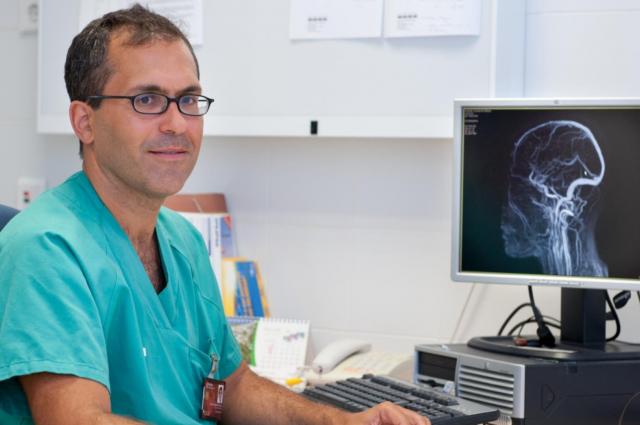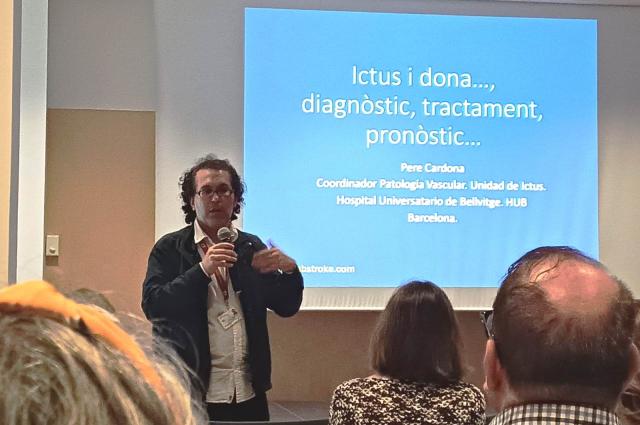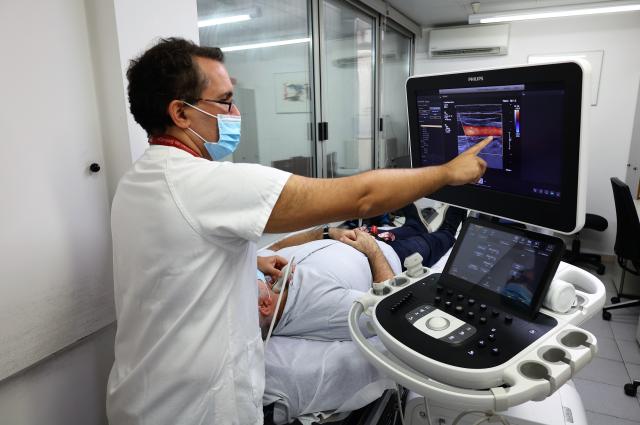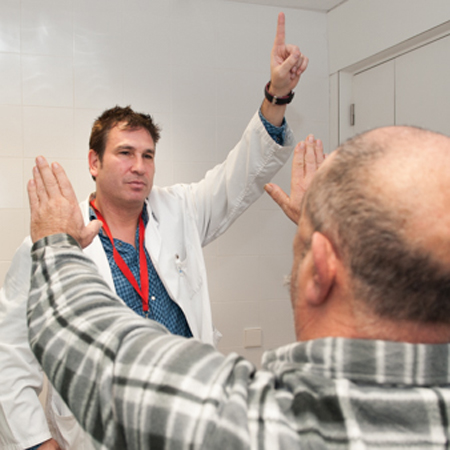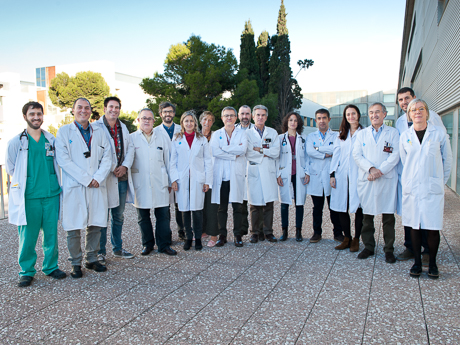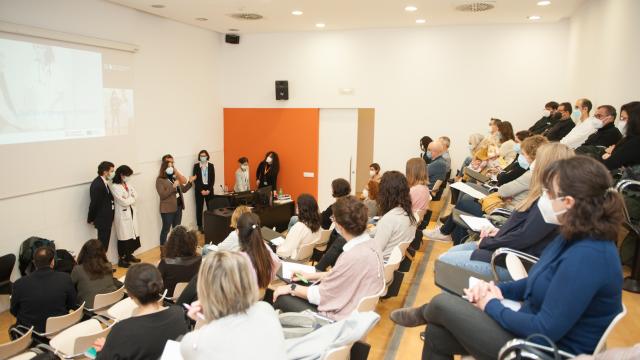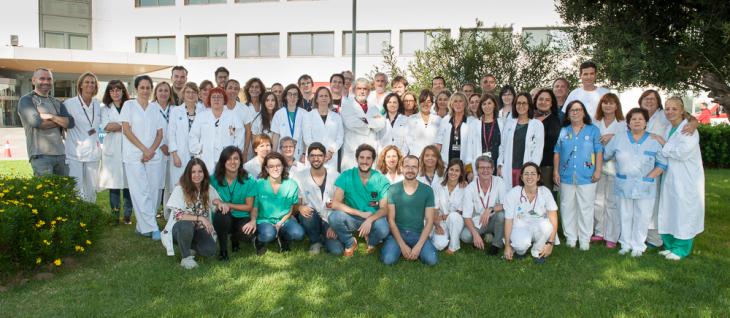
Introduction
The Neurology Department is made up of neurologists, neurophysiologists and psychologists, who provide neurological coverage to our region from basic outpatient care to highly complex pathologies (tertiary activity), and is a centre of reference for some of these pathologies throughout the south of Catalonia.
Our activity is structured around healthcare processes developed with all the professionals involved: primary care, other departments in our hospital, general hospitals in our surrounding area. The integration, multi-disciplinary structure and cooperation of all these players aims to truly place the neurological patient at the centre of our care, prioritising excellent, quality care that remains humane.
Every year we deal with over 1000 hospitalised patients, see over 25,000 outpatient consults, over 2,000 day hospital sessions, and more than 6,000 supplementary tests.
Related news
Team
Head of Service
Head of Section
Program Director
Specialist Doctors
Neuropsychologists
Head of Nursing Area
Nurse Manager
Relevant aspects
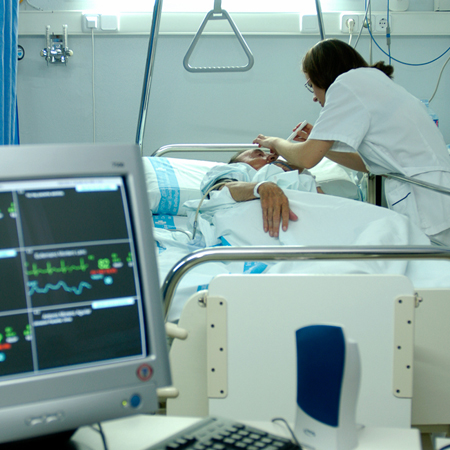
Tertiary Stroke Centre
- Bellvitge Hospital is a Tertiary Stroke Centre that takes part in the ICS corporate neurovascular emergency shift with a neurovascular Unit on duty to ensure endovascular reperfusion treatments. We have a Stroke Unit with 10 beds. In 2017 we attended 760 Stroke Codes, performing 132 endovenous treatments and 170 thrombectomies.
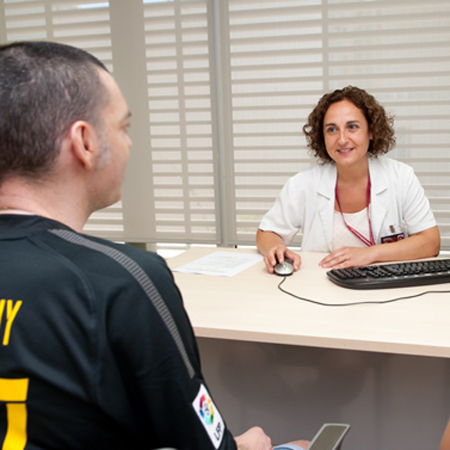
Multiple Sclerosis Unit-ME Network
- The Multiple Sclerosis Unit at our centre is one of the oldest in the country. It currently cares for around 700 patients in specific treatment for this disease, takes part in different clinical trials, and has been involved in various research projects leading to several Doctoral Theses. It has helped train specialists in ME who are now working in hospitals in our surrounding area. Structural care is being developed in a Network with other centres in our surrounding area in order to care for patients in their home and to work together with other care systems (primary care, community healthcare, etc.)
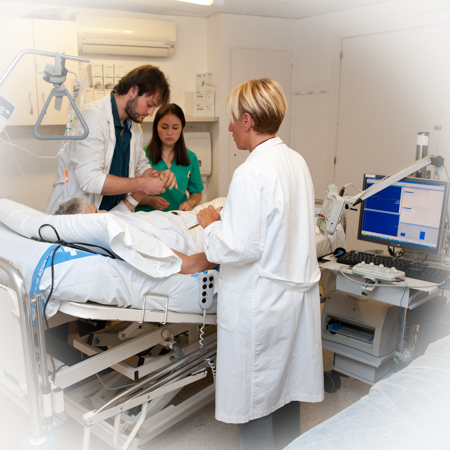
Multi-Disciplinary Motor Neurone Disease Unit
- Our centre has the first multi-disciplinary care unit for patients with motor neurone diseases. We work actively with the Miquel Valls Foundation supporting patients with ALS. This model provide comprehensive care to patients and their families, avoiding the different visits on different days, so that the patient is seen by all the specialists required on the same day.
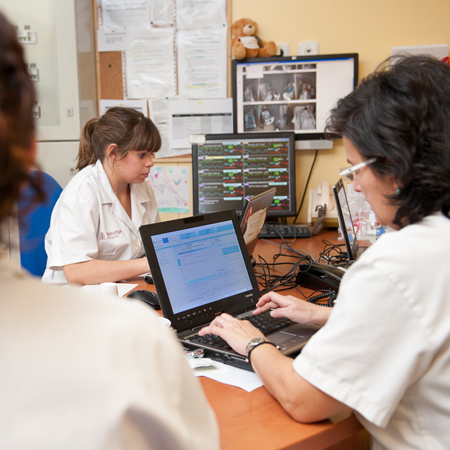
Functional Epilepsy Surgery and refractory epilepsy unit
- The Department has an Epilepsy Unit where patients with refractory epilepsy are seen and that admits patients for continuous video monitoring. We also have a multi-disciplinary unit to assess whether refractory patients are candidates for epilepsy surgery.
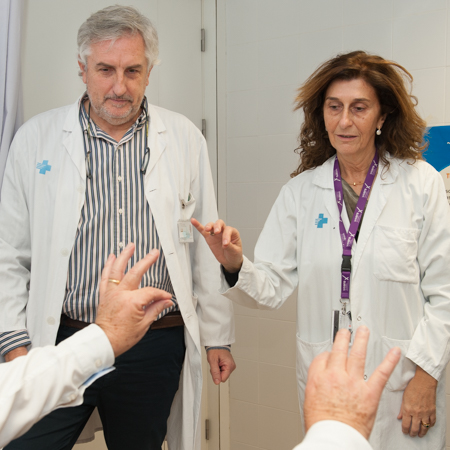
Movement Disorder and Movement Disorder Surgery Unit
- The Movement Disorder Unit at our centre provides care for patients with different diseases (Parkinson’s, Huntington’s, PSP, etc.) and is one of the few units in our country to offer the entire range of possible treatments for advanced Parkinson’s disease.
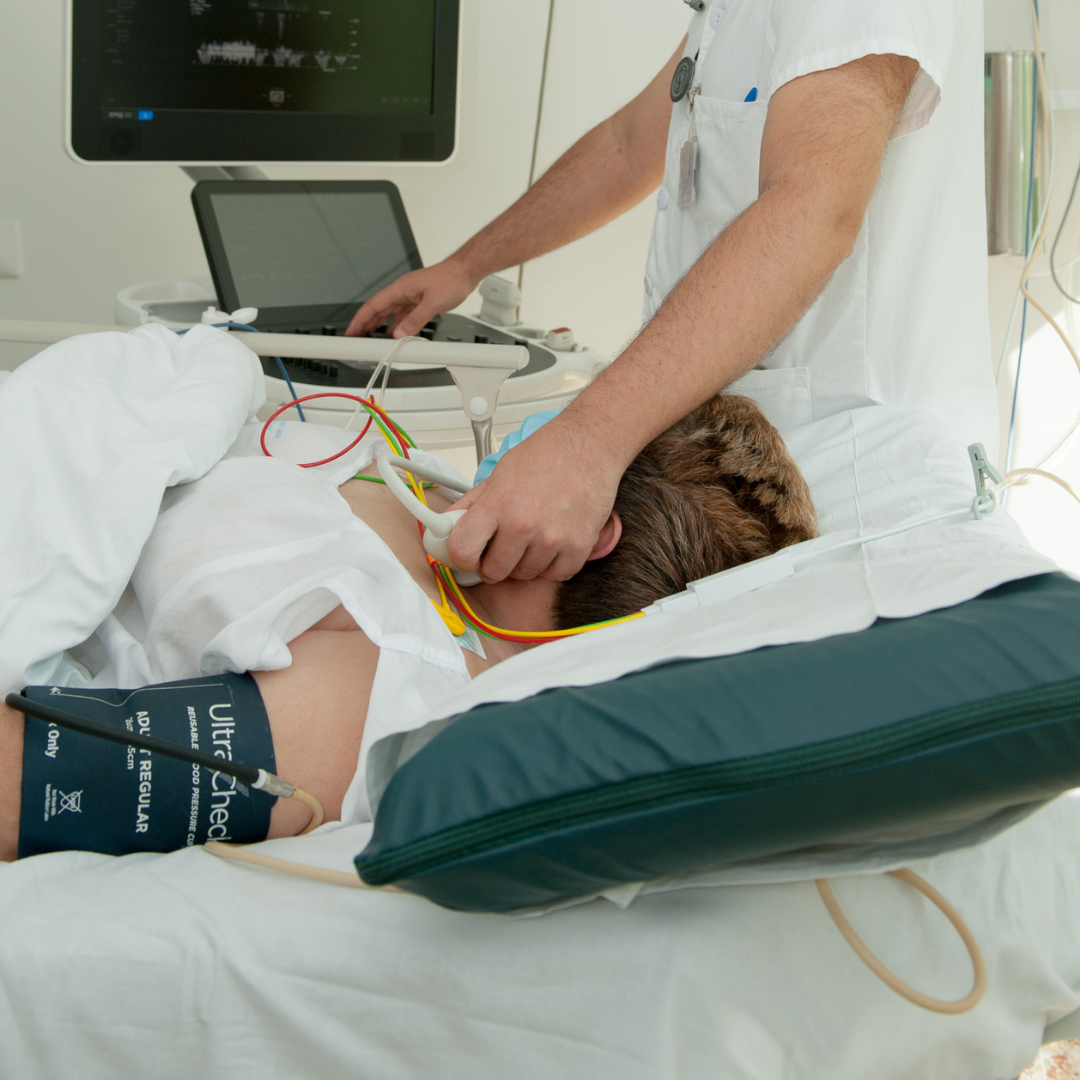
Neuro-oncology Unit
- Thanks to the proximity and collaboration of the Hospital and the ICO, and among the different departments (neurology, neurosurgery, oncology, radiotherapy, etc.), the Functional Neuro-oncology Unit was created to care for patients with neurological complications, cancer patients, and patients suffering from some kind of brain tumor with comprehensive, multi-disciplinary coverage.
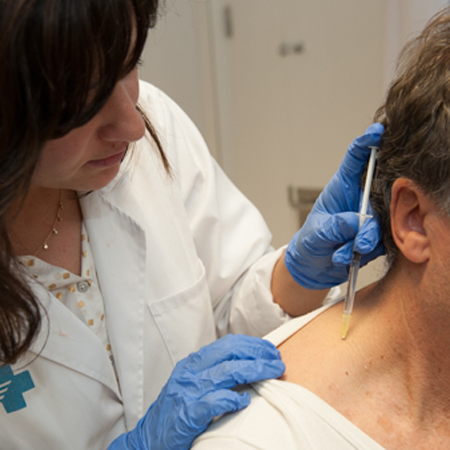
Southern Metropolitan Headache Unit
- This unit is made up of professionals from HUB and from Viladecans Hospital who specialise in the treatment of refractory headaches, acting as a centre of reference when the specialists in the area or from other centres around us need support or specialist treatments (toxin, infiltrations, etc.) for patients with headaches. It takes part in international clinical trials and its members are a reference in the handling of headaches in Spain.
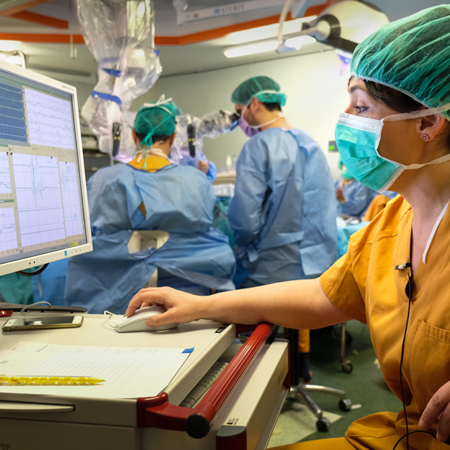
Intraoperative Monitoring Unit
- In order to reduce the surgical complications associated to neurosurgical treatment, the neurophysiology section has an intraoperative monitoring unit. Our centre was one of the first in Spain to implement it, and it is now an essential tool for neurosurgeons to ensure they do their job properly in the operating theatre. The neurophysiology section provides support for the critical units of the hospital (ICU, REA, Coro) in the diagnosis and treatment of comas, prognostic assessment, EEG sedation status monitoring, etc. This improves the prognosis in cases with status, and provides support in decision making regarding patients in anoxic or post-traumatic coma.
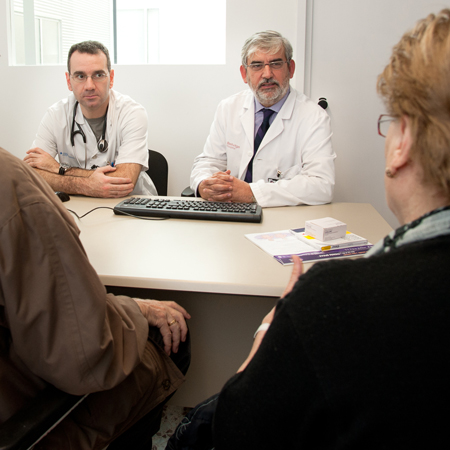
Dementia Diagnosis and Treatment Unit
- Our DDTU acts as a reference for our region of direct influence for the diagnosis and treatment of patients with cognitive impairment. It works together with our neurologists at the Specialist Care Centres and performs neuropsychological evaluations for them and for other hospitals in our region.
Research
Lines of research
- Biomarkers and prognostic clinical factors in Multiple Sclerosis
- Health results in Multiple Sclerosis
- Biomarkers and prognostic clinical factors in motor neurone diseases
- Healthcare models for ALS patients
- Dysphagia and nutrition in patients with motor neurone disease
- Epidemiology in ALS
- Clinical characterisation of spastic paraparesis
- Treatment of Adrenomyeloneuropathy
- Treatment of chronic dysimmune neuropathies
- New therapies in refractory myasthenia gravis
- Multi-disciplinary Management of Familial Amyloidosis
- Epidemiology of Guillain-Barré Syndrome
- Treatment and prognosis of cerebrovascular disease
- Prognostic markers in mild cognitive impairment
- Frontotemporal dementia
- Clinical and prognostic markers (biochemical and neuroimaging) in dementias
- Diagnostic markers (biochemical and neuroimaging) in Niemann-Pick disease type C.
- Advanced Parkinson’s disease: prognosis and treatment.
- Natural evolution and clinical profiles of Huntington’s disease.
- Immune-mediated epilepsies
- Prognosis and treatment of refractory epilepsy.
- Migraine treatment
- Prognosis of primary brain tumors
- Effects on the central nervous system of chemotherapy
- Use of neurophysiological techniques in coma prognosis.
- Clinical evaluation of the efficacy of new drugs and new therapeutic approaches against gliomas and meningiomas.
- Chemotherapy-induced peripheral neuropathies
- Cancer and cognition
- Leptomeningeal metastases
- Survival prognosis factors involved in tumors of the central nervous system
- Prevention and personalised treatment of cerebral metastases: development of new therapies based on prevention and biomarker prognosis
- Gliomagenesis and signalling mechanisms for resistance and adaptation to gliobastoma treatment
Main Publications
- Blanch M, Dorca-Arévalo J, Not A, Cases M, Gómez de Aranda I, Martínez-Yélamos A, Martínez-Yélamos S, Solsona C, Blasi J. The Cytotoxicity of Epsilon Toxin from Clostridium perfringens on Lymphocytes Is Mediated by MAL Protein Expression. Mol Cell Biol. 2018 Sep 14;38(19). pii: e00086-18. doi: 10.1128/MCB.00086-18. Print 2018 Oct 1.
- Yagüe S, Veciana M, Casasnovas C, Ruiz M, Pedro J, Valls-Solé J, Pujol A. Evaluation of afferent pain pathways in adrenomyeloneuropathic patients. Clin Neurophysiol. 2018 Mar;129(3):507-515.
- Martínez-Campo Y, Homedes C, Lazaro A, Alarcón R, Campo D, Riera M, Domínguez R, Povedano M, Casasnovas C. Observational study of patients in Spain with amyotrophic lateral sclerosis: correlations between clinical status, quality of life, and dignity. BMC Palliat Care. 2017 Dec 19;16(1):75.
- Seizure-susceptible brain regions in glioblastoma: identification of patients at risk. Cayuela N, Simó M, Majós C, Rifà-Ros X, Gállego Pérez-Larraya J, Ripollés P, Vidal N, Miró J, Gil F, Gil-Gil M, Plans G, Graus F, Bruna J.Eur J Neurol. 2018 Feb;25(2):387-394. doi: 10.1111/ene.13518. Epub 2017 Dec 11.
- YKL40 in sporadic amyotrophic lateral sclerosis: cerebrospinal fluid levels as a prognosis marker of disease progression. Andrés-Benito P, Domínguez R, Colomina MJ, Llorens F, Povedano M, Ferrer I. Aging (Albany NY). 2018 Sep 13;10(9):2367-2382. doi: 10.18632/aging.101551.
- Expert Opinion on the Management of Lennox-Gastaut Syndrome: Treatment Algorithms and Practical Considerations. Cross JH, Auvin S, Falip M, Striano P, Arzimanoglou A. Front Neurol. 2017 Sep 29;8:505. doi: 10.3389/fneur.2017.00505. eCollection 2017. Review
Docència
Degree Education
- Semiotics and Clinical Propedeutics for 3rd year Medicine and Nervous System Diseases for 4th year Medicine. Carlos Casasnovas Pons: Associate professor, Faculty of Medicine, University of Barcelona. Bellvitge Campus.
- Semiotics and Clinical Propedeutics for 3rd year Medicine and Nervous System Diseases for 4th year Medicine. Sergio Martínez Yélamos: Associate professor, Faculty of Medicine, University of Barcelona. Bellvitge Campus. Medicine Degree.
- Semiotics and Clinical Propedeutics for 3rd year Medicine and Nervous System Diseases for 4th year Medicine. Misericórdia Veciana de las Heras: Associate professor, Faculty of Medicine, University of Barcelona. Bellvitge Campus.
- Semiotics and Clinical Propedeutics for 3rd year Medicine and Nervous System Diseases for 4th year Medicine. Pere Cardona Portela: Associate professor, Faculty of Medicine and the University School of Nursing. Bellvitge Campus. University of Barcelona.
- Jordi Bruna Escuer: Associate professor from the Faculty of Medicine of the UAB, Cellular Biology, Physiology and Immunology Department. Bellaterra.
- Roser Velasco Fargas: Associate professor from the Faculty of Medicine of the UAB, Cellular Biology, Physiology and Immunology Department. Bellaterra.
- Jordi Gascón Bayarri: Associate professor from the Faculty of Medicine of the UAB, Morphological Science Department, UAB. Bellaterra.
- Serge Jauma Classen: Professor of the University School of Nursing. Bellvitge Campus. University of Barcelona.
- Post-graduate degree in Electrodiagnosis Applied to Neuromuscular Pathology and Neuropathic Pain from the University of Barcelona.
- Post-graduate degree in “Physiological ageing medicine" Autonomous University of Barcelona.
Masters degrees and accredited courses
- University of Barcelona
- Master’s in Advanced Medical Skills, specialising in Neuromuscular Diseases, from the University of Barcelona
- Official Master’s Degree in Neuroscience, UAB
Location
Main Building at Bellvitge University Hospital
c/ Feixa Llarga, sn.
08907 L’Hospitalet de Llobregat. Barcelona
Hospitalization Unit | Floor 9
Neurophysiology and Multiple Sclerosis Unit | Module E Floor 1
Outpatient consultations | Module 14 Floor 1
Telephone number 93 260 77 11

